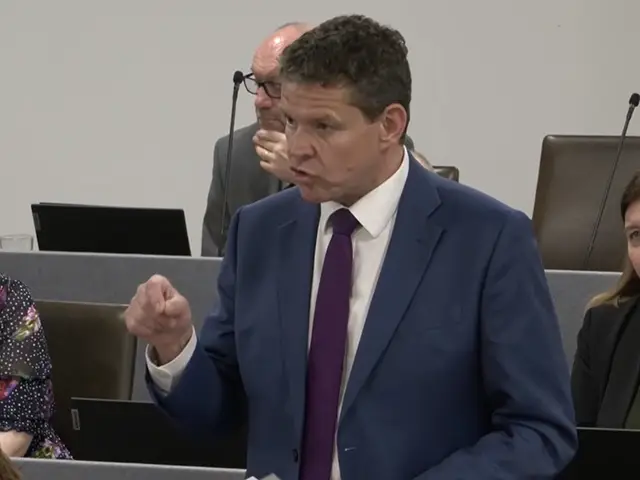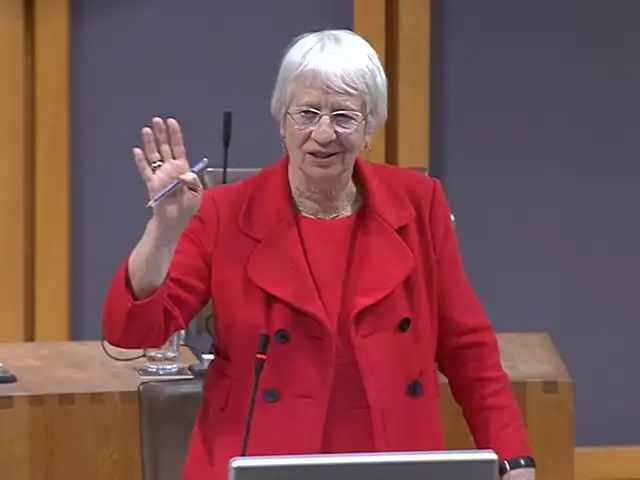Support quality, independent, local journalism…that matters
From just £1 a month you can help fund our work – and use our website without adverts. Become a member today

The Welsh Government has rejected calls to copy Scotland’s direct payment to address child poverty, arguing Wales does not have the required powers over the welfare system.
The claim was made in response to a Plaid Cymru debate, which urged ministers to introduce a similar direct payment to tackle Wales’ “stubborn” 32% child poverty rate.
Plaid Cymru’s Sioned Williams said: “I’m sick of it, to tell you the truth. I’m sick of standing up here and talking about this… we owe it – all of us – to the people we represent to do better.”
The shadow social justice secretary drew a parallel with a successful free school meals campaign, suggesting ministers’ scepticism about a child payment is similarly misplaced.
She told the Senedd: “We pushed for free school meals, which we were also told rather dismissively were not affordable, credible or deliverable – until, of course, they were.”
‘Headline-catching gimmicks’

But Conservative Altaf Hussain dismissed Plaid Cymru’s proposed child payment which would see £10 a week paid to about 15,000 children whose parents receive universal credit.
He said: “Rather than focusing on tackling the root causes of child poverty, Plaid have decided to opt for headline-catching gimmicks. And it’s not even their own idea.”
Dr Hussain added: “They’re stealing the ideas that have not even worked.”
He said the Scottish child payment is now nearly three times higher than when introduced, costing £114m between April and June this year yet a key child poverty target was missed.
Calling for a focus on economic inactivity instead, the surgeon-turned-politician told the Senedd that soaring childcare costs present a “huge barrier” to work.
Rhun ap Iorwerth rebutted the criticism, pointing out that Scotland is the only UK nation where child poverty is expected to fall – because of the direct payment.
‘Triple squeeze’

Recognising a lack of powers, the Plaid Cymru leader pointed to a “workaround” using the Government of Wales Act 2006 to introduce a payment. His party argued the real obstacle was getting the UK Government not to penalise recipients by cutting their universal credit.
His colleague Cefin Campbell, who represents Mid and West Wales, highlighted the crisis of rural poverty, which he said is often hidden and presents different challenges.
The former lecturer described families in rural Wales as facing a “triple squeeze” of rapidly rising living costs, low wages and unreliable public services.
Mabon ap Gwynfor – Plaid Cymru’s shadow health secretary – reframed the issue as a public health crisis, calling poverty the strongest determinant of health outcomes.
He warned the gap in healthy life expectancy between the richest and poorest parts of Wales is nearly 17 years, with disadvantage “built in before a child has reached the school gates”.
‘Nullified’

Labour backbencher Jenny Rathbone highlighted practical difficulties, reminding the Senedd of a Welsh basic income pilot scheme for care leavers.
During the debate on October 1, she warned the benefits of that scheme were “effectively nullified” when the UK Government cut recipients’ existing welfare payments in response.
Responding for the Welsh Government, Jane Hutt insisted tackling child poverty is an “absolute priority” but argued most of the policy levers lie with Westminster.
The social justice secretary pointed to free school meals for all primary pupils and expanding childcare as evidence of the Welsh Government’s commitment within its powers.
Ms Hutt stated “we simply don’t have the devolved powers” to legislate for a similar direct payment but she pointed to research under way on devolving the administration of welfare.
Support quality, independent, local journalism…that matters
From just £1 a month you can help fund our work – and use our website without adverts.
Become a member today
